To be born Russian is too little ...
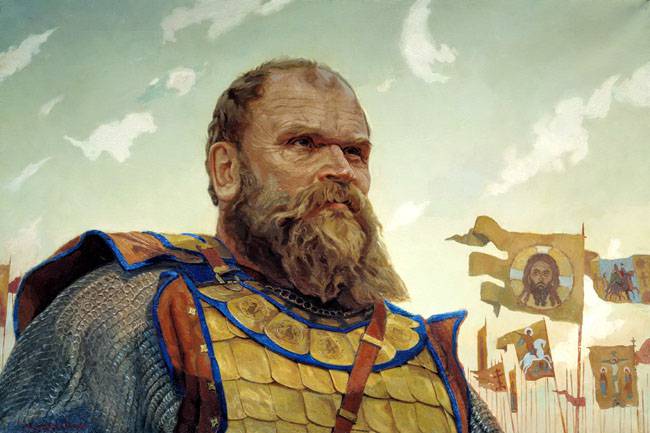
In 1569, the Lublin Union took place, uniting ON and the Kingdom of Poland (KP) into the Polish-Lithuanian Commonwealth confederation. The new state had a territory of almost a million square kilometers. Its population numbered about 8 million. It was one of the most powerful states of medieval Europe.
The Russian kingdom in this period exceeded the Rzeczpospolita in territory only at the expense of Siberia, but in terms of population (5 million) and in terms of economic potential, it was significantly inferior to it. After all, the lands of the western Russian principalities, which became part of the Great Britain and the Commonwealth, were richer and more equipped than the lands of northeastern Russia.
Given this circumstance, as well as the fact that after the death of Ivan IV the Terrible Smoot reigned in Russia, aggravated by poor harvests of several years, Rzeczpospolita strengthened its expansion. It began with the fact that the Polish-Lithuanian magnates supported impostors to the Russian throne, acting under the name of a Falsmitter. The ancient coat of arms of the Grand Duchy of Lithuania
Carved coat of arms of the Grand Duchy of Lithuania
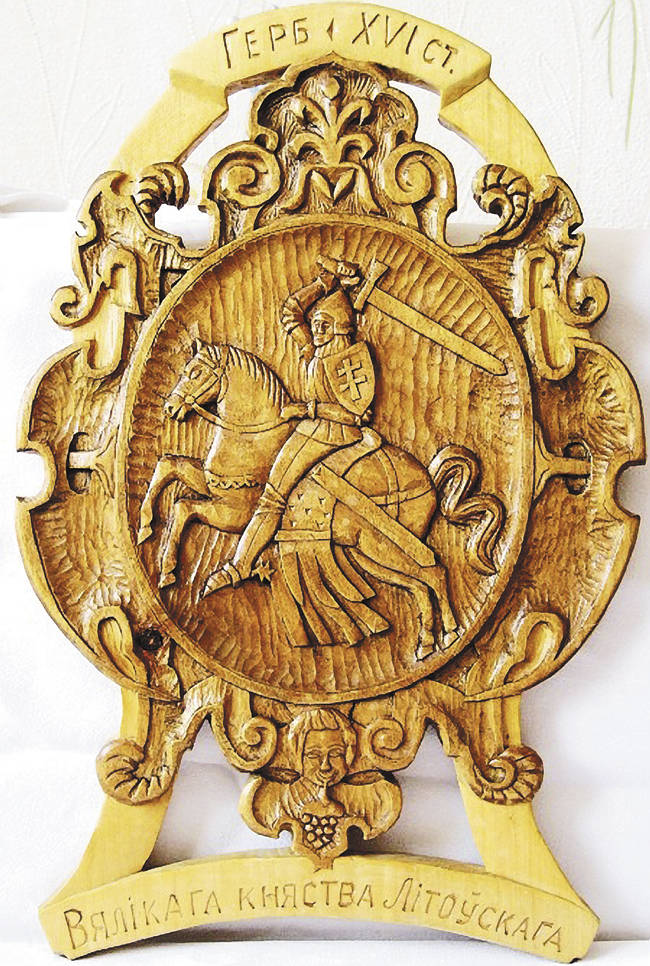
Well, in the summer of 1609, the Polish-Lithuanian army under the command of King Sigismund III invaded the Russian state, motivating it with the need to “establish peace and order”. It should be borne in mind that the Poles have always been convinced of their unconditional primacy among the Slavs, which allegedly gave them the right to play the role of "elder brother", ready to restore order on the lands of the "younger brothers".
In September of the same year, the army of Crown Hetman Lev Sapieha began the siege of Smolensk. In June, the 1610 th horse corps of the "winged hussars" of hetman Stefan Zolkiewski near Klushin utterly defeated the army sent by Tsar Vasily Shuisky to help Smolensk.
Taking advantage of this circumstance, the Seven-Boyars overthrew Shuisky and tonsured him as a monk. Then "Seven Boyars" and Patriarch Filaret signed a treaty with King Sigismund III and invited his son, King Vladislav, to the throne.
Further more. On the night of 21 on 22 of September 1610, the Polish-Lithuanian troops entered the Kremlin with the consent of the Moscow boyars. Poles and Lithuanians got a real opportunity to include the Russian kingdom in the Polish-Lithuanian Commonwealth and create the greatest empire in the world.
But ... Korolevich Vladislav was in no hurry to accept Orthodoxy. His father, Catholic King Sigismund, ruled Russia on his behalf. And service Poles and Litvins, or rather the Polish-Lithuanian gentry, entrenched in the Kremlin, created such “indecency” that they outraged not only Muscovites, but most of the inhabitants of the Russian land.
The nobility’s behavior was based on the conviction that only they are “political and civilized people” living according to democratic laws. True, it was a democracy only for the gentry class. Pushkin's contemporary, Russified nobleman Thaddeus Bulgarin (born Jan Tadeusz Krzysztof Bulgarin) wrote about the gentry democracy in the Commonwealth:
"In Poland, from the beginning of the centuries, they talked about freedom and equality, which no one actually enjoyed, only wealthy pans were completely independent from all authorities, but it was not liberty, but self-will ...
The gentry, lush and unenlightened, was always completely dependent on everyone who fed and watered it, and even entered the lowest positions of gentry and wealthy gentry, and patiently endured the beating - with the condition of being beaten not on bare ground , and on the carpet ...
The villagers were generally oppressed, and in Lithuania and Belarus their situation was much worse than the Negroes ... "
Russian gentry were considered not just cattle, but barbarous cattle, which should be “brought up” only with “fire and sword”. In fact, it was the “civilized” noblemen nobles who needed to be brought up with “fire and sword”.
The following facts indicate their behavior in the Kremlin. Polish-Lithuanian gentry looted and shattered the ancient churches of the Kremlin, despite the fact that there were icons of Jesus and the Virgin Mary, which the Roman Church also honored.
This happened at the beginning of their justification in the Kremlin. Moreover, these actions were not provoked by the armed resistance of the Russians. Well, when that started, the occupiers were not shy. In March, 1611, in response to the insurrection of Muscovites that began, the nobility burned down half of Moscow without any hesitation.
But the true essence of the gentry character manifested itself later when a famine began among the Polish-Lithuanian garrison blocked in the Kremlin. Eyewitnesses of events described scary pictures. In large vats lay dressed and salted human corpses.
The captured Lithuanian party Osip Buzila in his diary "History Dmitry Fake "wrote:" ... Lieutenant Truskovsky ate two of his sons, one haiduk ate his son too, one comrade ate his servant; in short, the father of the son, the son of the father did not spare ... whoever could, who was healthier than the other, he ate. ”
Recall that in the besieged Smolensk in 1609-1611. or in besieged Leningrad in 1941-1942. hunger was no less terrible, but it did not reach mass cannibalism. Nevertheless, the Poles still present their stay in the Kremlin as the great mission of familiarizing Asian Muscovy with the civilized world.
Speaking of Smolensk, it is impossible not to remember that when the 2 of June 1611, the Poles broke into the besieged city, a part of Smolensk, hiding in the Cathedral of the Virgin, performed a great feat: they blew themselves up together with the enemies. But a year later, retribution overtook the Poles.
October 26 1612 (old style) The second Russian militia led by Prince Dmitry Pozharsky and Nizhny Novgorod headman Kuzma Minin forced the Polish-Lithuanian garrison in the Kremlin to capitulate.
So the Polish-Lithuanian Commonwealth, possessing at the beginning of the XVII century an incomparably more powerful economic and human potential than the Russian kingdom, missed the chance to become a great power, uniting the Polish, Lithuanian and Russian lands. But this does not prevent modern Polish politicians from presenting external forces and, above all, Russia, as the perpetrators of all Polish ills.
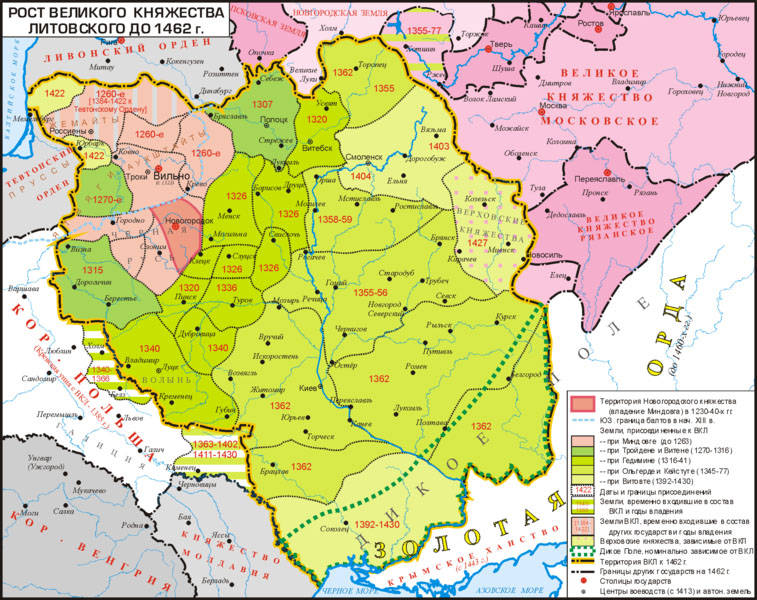
I should add that the haughty-lordly attitude towards other peoples was preserved by the Polish gentry in the 20th century. In 1925, the well-known Polish publicist Adolf Nevchinsky stated on the pages of the Slovo newspaper that with Belarusians who rebelled against Polish oppression, they had to speak in the language of “hangers and only hangers” ... This will be the most correct resolution of the national issue in Western Belarus. The question arises. How long could a state exist in which the gallows were the main instrument for ensuring national harmony?
But back to the medieval Rzecz Pospolita. Analyzing its structure, one inevitably comes to the conclusion that this state was initially doomed to ruin. The main reason for this lurked in the Polish gentry, whose ranks joined the Litvinsky boyars.
By the XVII century, the famous gentry democracy in the Polish-Lithuanian Commonwealth turned into anarchic freedom. And the principle of “liberum veto” (the right to a free ban or the requirement of unanimity in adopting laws in the Seimas) led to the actual paralysis of the authorities - as a result, practically no decision could take effect.
Any deputy could disrupt the meeting of the Seimas, or as the ambassador called him. For example, in the 1652 year, the gentry ambassador from the Upits povet of the Trok province was demanded to close the Sejm. Deputies without objection parted! 53 meetings of the Seimas (about 40%!) Of the Commonwealth ended in the same way.
The exorbitant arrogance of the Polish gentry and its contempt for the serfs and hamam, which the gentry considered all foreigners and heretics-Orthodox, made their contribution to the decline of the Polish-Lithuanian Commonwealth. Such intolerance caused rejection among a large part of the population of the GDL, especially the Orthodox, which, after the Brest Union of 1596, turned out to be extremely disadvantaged.
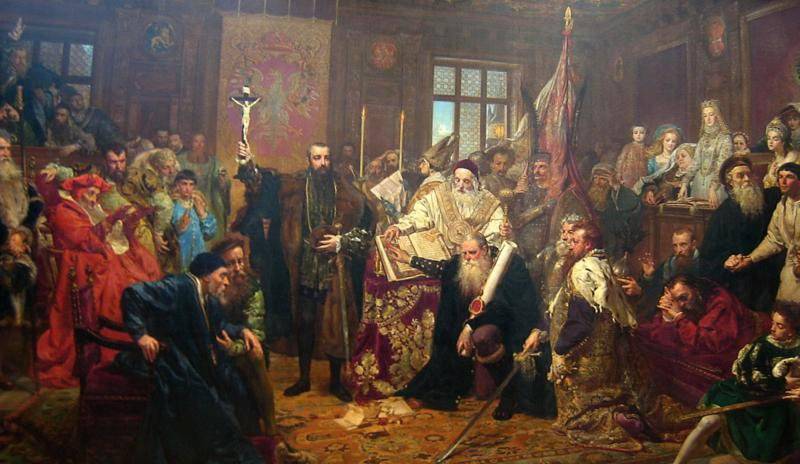
As a result, many looked with hope to Orthodox Muscovy, while the most resolute fled to the south, to the Zaporozhye region, which in the 16th century became the focus of Cossack freemen. There arose the Orthodox Zaporozhye Cossacks, which contributed to the decline of the Commonwealth.
It is known that for entry into the Army it was enough to properly baptize and speak Russian, no matter what dialect. Nikolai Gogol described this ritual most figuratively: “You believe in Christ? I believe! Do you drink vodka? Drink! Come cross! Truly a Christian soul, write it in the third smoking ... "
The Grand Duchy of Lithuania, following in the wake of the Kingdom of Poland, gradually became its junior partner, losing the remnants of its statehood. On the terms of the Union of Lublin, the Poles had to cede the three largest and richest southern voivodeships - Kiev, Volyn and Podolsk.
Poland was able to assign not only a part of the territory of the GDL, but also the history of the residence of this principality in the Polish-Lithuanian Commonwealth. In many historical sources devoted to this state, Lithuanians are simply absent. All the iconic figures of the Speech, which had Lithuanian, Belarusian or Ukrainian origin, are presented as Poles. Even the motto “From sea to sea” was assigned. Meanwhile, it is known that it was the GDL lands that provided Poland with access to the Baltic and Black Seas in the framework of the Commonwealth.
There is no doubt that Moscow Rus was more acceptable for the majority of Orthodox Litvin, because it was spiritually close to them. Yes, and religious tolerance in Moscow Russia was incomparably higher than in the Commonwealth. Although the hand of the Moscow autocrats was hard, it frightened less than the unbridled pride and religious-national intolerance of the Polish-Lithuanian gentry. Apparently, this decided the victory of Moscow Russia, and then the Russian Empire in the confrontation with the Commonwealth.
RUSSIAN-LITHUANIAN AND LITHUANIAN-RUSSIAN PRINCES
It has already been said that the rise of the Grand Duchy of Lithuania was largely due to Russian Orthodox men, including Rurikovich, who chose the Lithuanian principality as their Fatherland. Thus, it was documented that the Great Hetman of Lithuania, who had authority at the level of the Grand Duke of Lithuania, Prince Konstantin of Ostrog (1460-1530) led his pedigree from Prince Yaroslav the Wise of Kiev, that is, was Rurikovich.
Fame Ostrozhsky received as a commander who won the 33 battle, including the famous battle against the Moscow army near Orsha in September 1514. In the epitaph on his death, the monk of the Kiev-Pechersk Monastery Athanasius Kalnofsky (1638) called Ostrozhsky "Russian Scipio", although for Russia he was a Litvin.
Prince Ostrozhsky, as an Orthodox person, was buried in the main Orthodox shrine - the Assumption Cathedral of the Kiev-Pechersk Monastery. His son, the Kiev voivode Konstantin Konstantinovich, had the reputation of a defender of Orthodoxy in the Polish-Lithuanian Commonwealth and was captured on the monument "The Millennium of Russia".
I will cite another interesting fact. In 1512, the Grand Duchy of Moscow decided to return Smolensk, which fell under the authority of the GDL in 1404. The campaign was headed by the Moscow Prince Voivode Daniel Schenya, who took the city in July 1514 of the year. A little later, in September, the Lithuanian prince Konstantin of Ostrog attempted to return Smolensk under Lithuania. But unsuccessfully. This is the irony of fate.
Add to this the story of the famous Lithuanian hetman Jan Karol Chodkiewicz (1560-1621). He is known for his trips to Moscow during the Time of Troubles and the Polish-Lithuanian invasion. His ancestor was the Orthodox Kiev boyar Khodka (Fedor).
Grandson Khodky Grigory Alexandrovich Khodkevich (1505-1572), being the Great Hetman ON, in 1568, he set up a printing house at an Orthodox monastery in the town of Zabludovo. Moscow pioneer printers Ivan Fedorov and Peter Mstislavets continued their activities there. Well, the great-grandson of Walker, Jan Karol Chodkiewicz, is already remembered as an enemy of Russia.
It is known that Russian-Orthodox roots were the princely clans, whose representatives for centuries constituted the ruling elite of the Commonwealth. These are Vishnevetsky, Oginsky, Sapegi, Khodkevichi, Chartoryysky and the Counts of Tyshkevichi. Over time, they adopted Catholicism. Gentry liberties and brilliance of the courtyards of the yas-noble lords turned out to be more attractive to them than their grandfathers faith.
It should be recognized that the exchange process of the boyars was mutual. The power of Russia of Moscow also grew thanks to the nobility of the Grand Duchy of Lithuania, who chose Moscow as a new homeland. An example of this in the XIII century gave the Lithuanian prince Nalshans Dovmont. He has a Grand Duke Mindovg publicly took his wife. Dovmont did not tolerate offense and joined the conspiracy of princes Tovtivil and Troinat, as a result of which Mindovg was killed in 1263 year.
Fearing revenge on the son of Mindovg Voyshelka, Dovmont, with his newfound wife and 300 families of his closest circle, went to Pskov in 1265. There he was baptized and adopted the Orthodox name Timofey.
The Pskov principality at that time was an outpost of Russian lands and was constantly subjected to attacks by the Danes and the Livonian knights. Dovmanta’s military talents were noticed by the Pskovs, and a year later he was elected prince of Pskov. Under his leadership, the Pskov successfully repelled raids by uninvited guests. To protect Pskov from enemy attacks, Dovmont reinforced it with a new stone wall, which until the 16th century was called Dovmont.
In the encyclopedia of Brockhaus and Efron it is noted that “not a single prince was so loved by Pskovites as Dovmont. He was very religious, judged the people right, did not give offense to the weak, helped the poor. " After the death of the Russian Church Dovmont canonized saints. His body was buried in the Pskov Trinity Cathedral. His sword and clothing are also stored there. Dovmont Pskov immortalized on the monument "Millennium of Russia".
In addition to Dovmont, some descendants of the Lithuanian prince Olgerd Gediminovich and his brothers Narimant Gediminovich and Yevnut Gediminovich chose the Grand Duchy of Moscow as their Fatherland. Their departure from the Grand Duchy of Lithuania was caused by the policy of Prince Vitovt, who, in order to centralize the state, sought to eliminate the appanage princes. In addition, the decision to leave determined that the Orthodox Moscow Russia Gediminovich did not consider alien. Attitude to the Lithuanian princes in Moscow was more than welcoming.
The mass departure of the Orthodox Lithuanian gentry to the Moscow possessions began after Vitovt. This happened as a result of the aggravation of the conflict between the increasingly strong Catholic entourage of the Lithuanian grand dukes and the Orthodox Litvinsky nobility, whose rights were increasingly curtailed.
In Russia, the Gediminoviches became the second princely branch of nobility after Rurik. Practically all of them, being an important part of the Russian higher aristocracy, have played a prominent role in many events in the history of Russia since the 15th century.
The son of Lithuanian Prince Koriath (Mikhail) Gediminovich Dmitry Mikhailovich Bobrok Volynsky, voivode of Prince Dmitry Donskoy (died after 1389 of the year) covered himself with military glory.
In the 1379-1380 years, Prince Bobrok Volynsky successfully fought with Lithuania. But he distinguished himself in the battle on the Kulikovo Field (1380 year). There he commanded an ambush regiment and the successful timing of the attack decided this bloody battle in favor of the Russians.
The famous Russian commander of the times of Ivan III and Vasily III was the great-great-grandson of Narimunt Gediminovich, the previously mentioned prince-voivod Daniel Vasilevich Shchenya (tentatively 1440-1519). In 1493, he beat Vyazma away from the “Lithuanians”.
Later Schenya took an active part in the war with Lithuania for Chernihiv and Seversk lands (1500-1503). Then he struck the “Lithuanians” a sensitive defeat at Dorogobuzh. Then Shchen beat the knights of the Livonian Order. And, as already mentioned, he ensured the annexation of the Smolensk principality to Moscow. Schenya immortalized on the monument "Millennium of Russia".
The descendant of Gedimin's eldest grandson, Patrikey Narimantovich, was Field Marshal Mikhail Mikhailovich Golitsyn, an associate of Peter I, who distinguished himself in the war with the Swedes. He also attends the Millennium of Russia monument.
I should add that Patrikey Narimuntovich was the ancestor of the princely-boyar families of the Patrikevs, the Khovanskii, the Bulgakovs, the Schenatievs, the Kurakins, the Golitsins and the Koretskys. From the other Gediminas the families of Trubetskoy, Belsky, Volynsky and Mstislavsky went.
About the role played by the representatives of these clans, shows the history of the kind of princes Trubetskoy. They originate from the grandson of Gedimin, Dmitry Olgerdovich, a participant in the Battle of Kulikovo. It is known that Prince Dmitry Timofeevich Trubetskoy, a descendant of Dmitry Olgerdovich, was one of the leaders of the First People's Militia (1611), who tried to knock out the Polish-Lithuanian garrison from Moscow. He, before being elected in 1613, Mikhail Fedorovich, was the ruler of the Russian state.
For his work, Dmitry Trubetskoy received the title of “Savior of the Fatherland” and was one of the contenders for the royal throne at the Zemsky Cathedral 1613 of the year.
The fates of the Lithuanian-Russian and Russian-Lithuanian princely families listed above show how closely the fates of the Russians and Lithuanians were intertwined in the history of the Grand Duchy of Lithuania and the Moscow principality. In this regard, it is not quite correct to assess the confrontation of historical personalities and, accordingly, the states headed by them at that time, based only on an ethnonational characteristic, as Lithuanian historians do. Wars then were fought not so much because of national discord, but for power and influence.
And often the warring were from the same family nest. But fate, as often happens, divorced them. Recall that the confrontation of the Tver and Moscow princes, who had common ancestors, was very long and was particularly brutal. It is known that Mikhail Yaroslavovich Tverskoy, twice (1305 and 1308), marched on Moscow, trying to take it under his arm. But I could not. In Moscow, then, Prince Yury Danilovich, a distant relative of the Prince of Tver, reigned.
The confrontation of these two Russian princes ended with the dismantling of the complaint of Moscow Prince Yuri Khan Uzbek in the Golden Horde. As a result, Prince of Tver Mikhail was executed. Two years later, the son of Mikhail Tversky, Dmitry the Terrible Ochi, filed a complaint against Yuri Moskovsky and won the right to kill him right in the Khan's tent. In those days, such bloody squabbles were not uncommon.
Concluding the topic ON, we can draw the following conclusions. The Russian Orthodox component in the Grand Duchy of Lithuania was decisive, which makes it possible to evaluate the history of this state as an essential part of the history of Russia and Russia. With all the negativity that some Russian scholars often endow with VKL, it did a lot to make the population of the Russian principalities survive dashing times and later become an organic part of the Russian Empire.
Obviously, it was not by chance that the Lithuanian princes Gedimin, Olgerd, Keystut and Vitovt were immortalized at the monument “The Millennium of Russia”, opened on September 9, 8 by Alexander II in Novgorod the Great. It was a tribute of imperial Russia to the Grand Dukes of Lithuania for their contribution to the preservation of culture, identity and the peoples of the western Russian principalities.
It should be borne in mind that the Russian Empire repeated the experience of the Grand Duchy of Lithuania, with “affection” absorbing new territories, new peoples and new beliefs into its borders. The new “blood” gave a new impetus to the development of Russia. And the indigenous peoples of Siberia and America still remember the good attitude of the Russian pioneers.
The American Indians in Alaska and in California still remain faithful to Orthodoxy, bear Russian names, and cherish the good memory of Russian settlers. Those respecting the customs and traditions of the American Aborigines taught them a lot.
Although it should be recognized that affection affection, and Moscow guns often fired, ensuring the accession of new territories. However, there were Russian features of this process. Thus, the descendants of the Siberian Khan Kuchum, with whom Yermak fought, in Russia began to be called the Siberian princes and were entered into the pedigree "Velvet Book" of the Russian nobility. They served the New Fatherland with zeal. The descendants of the leaders of the American Indians could not even dream of such a thing.
TO BE BORN TO RUSSIAN TOO LITTLE
Summing up the discourse on Russia the Great and Grand Duchy of Lithuania, it should be concluded. For any multinational state, and especially for the Russian Federation, death is like making one nation titular, the rest minor, one religion - the sovereign, the others - minor.
Today, when interethnic and religious strife has spilled onto the streets of cities in several countries of the world, attempts to reanimate the historical content of the terms “Great Russians” and “Great Russia” in the Russian Federation will inevitably lead to an increase in interethnic tension.
At the same time, it should not be forgotten that the Russians are the state-forming nation, which places special responsibility on them for the fate of Russia. But this does not indicate their exclusivity or birthright. They just have more responsibility.
In this regard, I once again want to note the importance of the term “Great Russia” proposed by Pavel Evdokimov, as a triune Russian people, uniting Russians, Ukrainians and Belarusians, or rather, uniting all “Russians” of Russia, Belarus and Ukraine. It is not by chance that the poet Igor Severyanin at the beginning of the twentieth century wrote: “To be born Russian is too little. They need to be. They need to become! "
The historical development of Russia / Russia also testifies in favor of the term “Great Russia”. In its territory over the past centuries, a truly Babylonian intermingling of nations and nationalities took place. In this regard, the pompous statement of some Russians that they are “Great Russians” brings a smile. I will mention several well-known surnames, whose representatives without hesitation can be referred to as genuine “Great Russians”. But…
This is the associate of Peter I, Count Boris Petrovich Sheremetev (1652-1719), the poet Gavrila Romanovich Derzhavin (1743-1816), the first first president of the Russian Academy of Sciences Ekaterina Romanovna Dashkova (1743-1810), the famous admiral Fedor Fyodorovich Ushkov, and the graduates of the Russian Academy of Sciences. historian and writer Nikolai Mikhailovich Karamzin (1744-1817), Chancellor Alexander Mikhailovich Gorchakov (1766-1826), writer Ivan Sergeevich Turgenev (1798-1883), writer Mikhail Afanasyevich Bulgakov (1818-1883). Their RUSSIANNESS, it would seem, no doubt.
However, it is little known that the founders of these Russians were the Golden Tatars. This is documented. For example, the aforementioned historian Karamzin was descended from the Crimean Tatar family of Kara-Murza. The writer Turgenev's ancestor was the Tatar murza Arslan Turgen, and the Bulgakov had the Horde khan Bulgak.
I should add that the Russian nobility Suvorov, Apraksins, Davydovs, Yusupovs, Arakcheevs, Golenishchevs-Kutuzovs, Bibikovs, Chirikovs came out of the family of Khan Berke, brother of Baty. By the end of the 20th century, there were approximately 70 thousand nobles in Russia with Tatar roots.
Tatar ancestors were Russian scientists Mendeleev, Mechnikov, Pavlov, Timiryazev, researchers of the North Chelyuskin and Chirikov, composers Scriabin and Taneyev. What should they count? The story gave an unequivocal answer to this question. They are great RUSSIANS and have always recognized themselves as Russians, while knowing and proud of their ancestry.
Great Russian steel and people from other nations. We all know the great Russian poet Alexander Sergeevich Pushkin. He is remarkable not only for his literary works, but also a huge contribution to the formation of the modern Russian language. Meanwhile, Alexander Sergeevich's great-grandfather was “arap Peter the Great,” an Ethiopian Abram Petrovich Hannibal.
Vladimir Ivanovich Dal made a no less significant contribution to the formation of the modern Russian language. In 1880, he published the Explanatory Dictionary of the Living Great Russian Language. This dictionary is still in demand. Dahl's father was a Dane, Johan van Dahl, and her mother, a Frenchwoman, Maria Freytag.
Mikhail Yuryevich Lermontov's ancestor was the famous Scot Lermont, about the exploits of which Walter Scott wrote a ballad. In the Soviet school, Russian writer Denis Ivanovich Fonvizin, the author of the famous Nedoroslya, was known to all. He was descended from a Livonian knightly family von Wiesen (German von Wiesen). But Pushkin said about him that he was "from Russian Pereruskie".
At the Kazan Cathedral in St. Petersburg there are two bronze figures - Michael Illarionovich Kutuzov and Mikhail Bogdanovich Barclay de Tolly. One is a representative of an ancient Russian noble family with Tatar roots, the other is of the same old Scottish family. Both are Russian commanders who made a huge contribution to the victory in the 1812 Patriotic War of the year.
It is impossible not to recall another Russian commander of Georgian origin, Pyotr Ivanovich Bagration. Napoleon considered him the best Russian general. The prince laid down his head after being fatally wounded at the Borodino field in 1812, giving his life for Russia.
Everyone from school has known the names of the Dane Vitus Bering, the Russified Germans Thaddeus Bellingshausen and Adam von Krusenstern. These mariners glorified Russia, defeating the oceans and discovering new lands. Today, the world's largest Russian sailing barque is named after Kruzenshtern.
The history of Russia testifies to the unique ability of the Russian people to attract foreigners to the service who can significantly accelerate the development of the country. Fedor Mikhailovich Dostoevsky called this ability "worldwide responsiveness."
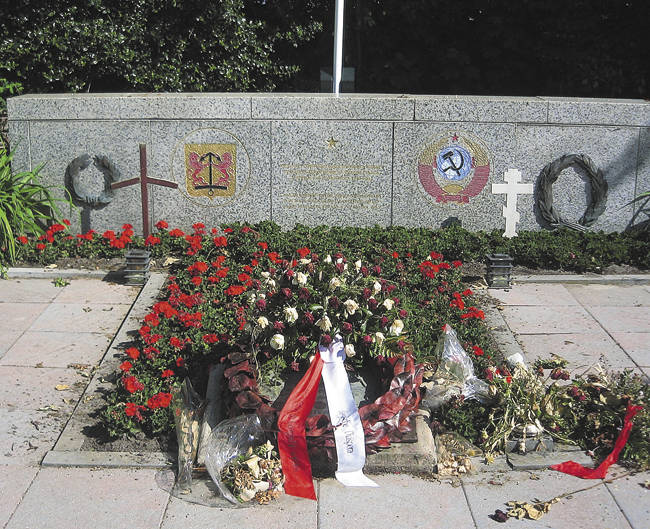
Let me give a few names of our contemporaries. Russian people in spirit, but ethnically not completely Russian. The Russians well remember the untimely deceased Russian General Lev Rokhlin, whose whole life was a vivid example of serving Russia. His father was a Jew. The ballet dancer Nikolai Tsiskaridze, twice laureate of the Russian award, is known for his struggle for the purity of Russian culture. His parents are Georgians. Well, about Elena Isinbayeva can not speak. It glorifies Russia not only with its sporting achievements. For many in the world, it is the standard of Russian femininity and morality. Her father is Dagestan, her mother is Russian.
The list of Russian “foreigners” who have made and are making a great contribution to the prosperity of Russia could be continued. But it is too extensive. I will only add that "foreigners" in Russia have always been divided into two categories. Those who knew how and wanted to work for the good of Russia, and those about whom Lermontov wrote: "Laughing, he defiantly despised the lands of a foreign language and manners."
Unfortunately, recently the dominance of the latter has been observed in Russia. Accordingly, there is a revival of Russian ethnic nationalists, who believe that people should be assessed not so much by their deeds and attitudes toward the Fatherland, as by the purity of their blood. This is a dead-end approach for Russia, and Pavel Evdokimov’s article “From the Russian Federation to Great Russia” debunks it.
In this regard, a few words about yourself. In Lithuania, for the protection of the rights of Russians (Russians there are considered to be all Russian speakers), I face life imprisonment. According to Lithuanian prosecutors, the correspondence court on this matter will take place next year. However, if we proceed from the logic of some Russian nationalists, in Lithuania I had to take the position of an outside observer.
After all, I am only a mother (Voronezh peasant) Logunova Maria Ivanovna purebred Russian. And on the line of my father - the Swede Nikolai Andreevich - in my ancestors are listed: Greek Varvara, Zaporizhzhya Kozak Vasily Gruntenko, Polka Anna Khrenovska and an unknown Swede who gave our family a surname.
Therefore, I once again want to note the importance of the thought set forth in the article by Pavel Evdokimov. He emphasizes that the Russians are “all who consider themselves RUSSIANS”. This conclusion is of conceptual significance for the formation of modern Russian policy with regard to the “Russians” in the broad sense of the word.
In conclusion, I cannot fail to state one more fact. 7 May 2008, the newspaper "Arguments and Facts" published an article entitled "And then we were all" Russian. " It described how from April 5 to 20 in May 1945 of the year on the Dutch island of Texel there was an uprising of Georgian prisoners of war of Georgian nationality.
The locals called these prisoners "Russians." It is significant that the Georgians chose the Russian words “Happy Birthday!” As the password for the uprising. "Russian" Georgians courageously fought with the Nazis. But the forces were unequal. Germans threw to the island Aviation and about five thousand soldiers of the Wehrmacht.
They did not take prisoners. They forced a hundred of captured Georgians to dig a grave, and then they shot them. Before their death, the Georgians in Russian sang the Internationale. Only 228 rebels survived. The rest are buried in the so-called Russian cemetery under the emblem of the USSR. The countries that, during the war years, not only rallied people of many nationalities, but raised them in a single system, as RUSSIAN, to the defense of the freedom and independence of the Soviet homeland. It is known that Joseph Stalin (Dzhugashvili) called himself "a Russian man of Georgian origin."
Russians should not forget the wonderful traditions of interethnic friendship that took place in the country of the Soviets. And to revive them in the new historical realities is the task of every true patriot of Russia.
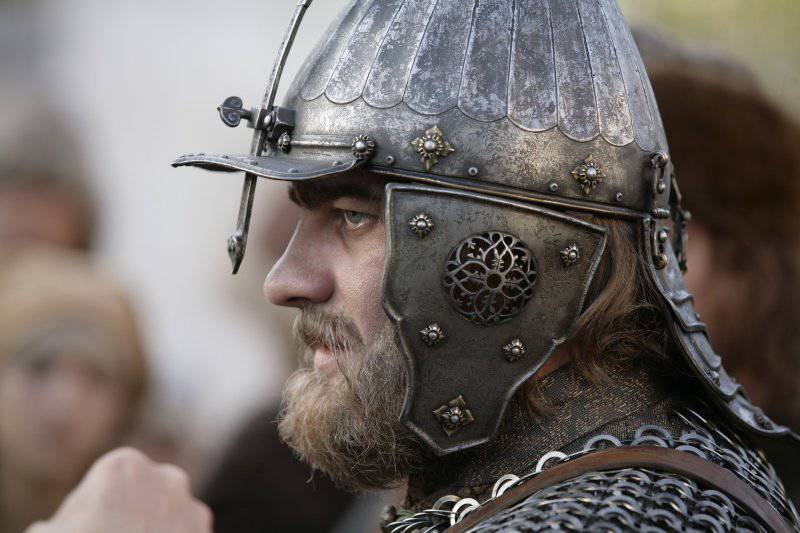
Information